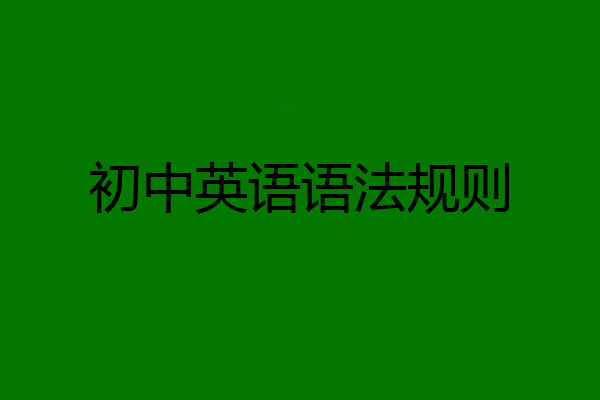 莮Renissodifficult
莮Renissodifficult
共2条回答303浏览
-
 壹家生活1小时前发布
壹家生活1小时前发布-

对于大部分初中生来说,英语语法是十分难学的,不仅难理解,不好记忆,部分复发内容还很容易混淆。下面是我为大家整理的关于初中英语必备语法知识,希望对您有所帮助。欢迎大家阅读参考学习!
初中英语语法知识 总结
一、时间状语从句种类
1、引导的从句表示主从句的动作同时发生,或从句的动作在主句之前。when引导的从句的谓语动词可以是延续性的动词,又可以是瞬时动词。例如:
When she came in, I stopped eating.她进来时,我停止吃饭。(瞬时动词)
When I lived in the countryside, I used to carry some water for him.当我住在农村时,我常常为他担水。(延续性的动词)
We were about to leave when he came in.我们就要离开,就在那时他进来了。
2、While引导的从句的谓语动作必须是延续性的,并强调主句和从句的动作同时发生(或者相对应)。并且while有时还可以表示对比。例如:While my wife was reading the newspaper, I was watching TV. (was reading是延续性的动词,was reading和was watching同时发生)I like playing football while you like playing basketball.我喜欢踢 足球 ,而你喜欢打 篮球 。(对比)
3、As表示“一边……一边”,as引导的动作是延续性的动作,一般用于主句和从句动作同时发生;as也可以强调“一先一后。例如:We always sing as we walk.我们总是边走边唱。(as表示”一边……一边“)As we was going out, it began to snow.当我们出门时,开始下雪了。(as强调句中两个动作紧接着先后发生,而不强调开始下雪的特定时间)
4、由before和after引导的时间状语从句,表示两个动作一前一后发生。 例如:It will be four days before they come back. 他们要过四天才能回来。
After you think it over, please let me know what you decide.你仔细考虑过以后,告诉我你是怎样决定的。
5、由till或until引导的时间状语从句。till和until一般情况下两者可以互换,但是在强调句型中多用until.并且要注意的是:如果主句中的谓语动词是瞬时动词时,必须用否定形式;如果主句中的谓语动词是延续性动词时,用肯定或否定形式都可以,但表达的意思不同。till不可以用在句首,而until可以放在句首。例如:
I didn't go to bed until(till)my father came back.直到我父亲回来我才上床睡觉。 I worked until he came back.我工作到他回来为止。
初中英语语法知识归纳
感叹句(Exclamatory Sentence)
感叹句通常有what, how引导,表示赞美、惊叹、喜 悦、等感情。
what修饰名词,how 修饰形容词,副词或动词,感叹句结构主要有以下几种:
掌握它的搭配,即掌握了感叹句的重点。
How +形容词+ a +名词+ 陈述语序
How+形容词或副词+ 陈述语序
What +名词+ 陈述语序
What+a+形容词+名词+ 陈述语序
What+ 形容词+复数名词+ 陈述语序
What+ 形容词+不可数名词+ 陈述语序
How clever a boy he is!
How lovely the baby is!
What noise they are making!
What a clever boy he is!
What wonderful ideas (we have)!
What cold weather it is!
感叹句的省略形式为:
What a clever boy (he is)!
定义:表达强烈情绪(喜、怒、哀、乐、惊、恐等)的 句子 叫做感叹句。
强烈情绪的表达通常有下列三种方式:
(a)使用感叹词;
(b)只用情绪感觉的语词,例如:
Water! Water! Quick!
(水!水!快!——如救火或救人时。)
What taste!
(这是什么味道啊!——如吃到怪味时)
(c)使用“How…!”或“What(a)…!”的句式,例如:
How beautiful you are, Helen!
(海伦,你是多么美!)
初中英语语法知识
可数名词的复数形式
1.可数名词的复数形式的规则变化:
1)一般情况,直接词尾加s, 读音:在清辅音后读/s/,在浊辅音和元音后读/z/,在t后读/ts/,在d后读/dz/,在以元音字母加y结尾的单词中,读/z/
如:cake-cakes,day-days ,student-students, bed-beds
2)以s,x,sh,ch等结尾的词,加es,读/ⅠZ/, 如bus-buses, class-classes, watch-watches
3)以辅音字母加y结尾的词,变y为i加es,读/z/
如:baby-babies, city-cities, country-countries, lady-ladies 4)部分以f(fe)结尾的词,变f(fe)为ves,读/vz/ 如:leaf-leaves, wolf-wolves, life-lives 5)以ce,se,ze,(d)ge等结尾的词,加s,读/ⅠZ/ 如:face-faces, orange-oranges
2.不规则变化
1)单复同形:fish-fish,sheep-sheep, deer-deer, Chinese-chinese, Japanse 2)个别字母变化:man-men, woman-women, foot-feet 其他:mouse-mice 某国人变复数
中国人:a Chinese-chinese
某国人:an Enlishman-Englishmen 阿拉伯人:an Arab-Arabs
口诀:中日不变英法变,其余s加后面
3)以-o结尾的名词,加es
记忆口诀:黑人英雄爱吃土豆西红柿 而一般情况下加s: zoo-zoos, radio-radios
4)复合名词前面的名词是man,woman变复数时,构成复合名词的两个名词全都要变成复数形式;若其他词,变复数时,只需把后面的名词变成复数形式。 a man teacher—men teachers
a boy student-boy students
5)字母、数字、引语或缩略(词)语的复数形式是其后加’s或s There are two f’s in the word “office”. Many VIPs are coming to our city.
6)有些以f或fe结尾的词直接加s变成复数 roof-roofs, belief-beliefs, proof-proofs, chief-chiefs
相关 文章 :
1. 初一英语期末必考12个语法知识点
2. 初中英语必须掌握的19个重点语法知识点
3. 初一英语语法知识必考的12个语法点
4. 初中英语五种语法知识点总结
5. 初一英语全册语法知识点汇总
-
-
 食戟之喵12小时前发布
食戟之喵12小时前发布-
初中语法汇总:8种时态、3种从句、2种语态。
一、八种时态:
1.一般现在时
表示平时经常的、习惯性的动作,描述平时所处的状态,表达平时存在的特征、有规律的状态等。
I drink water every day. 我每天都喝水。(习惯性动作)
2.现在进行时
表示正在发生的动作。经常用到的结构有be doing sth. 常和now, look, listen这些词连用。
She is dancing. 她正在跳舞。
3.一般过去时
由谓语动词的过去式表示,也就是说动词词末要加-ed(除不规则动词外)。常和一般过去时连用的过去时间状语有:last night (week ,month , year , century , etc.) , yesterday ,yesterday morning (afternoon , evening) , in 1999 , two hours ago等等。
4.一般将来时
表示将来要发生的动作或计划。结构有主语+will+动词原形和主语+be going to do。
I will go to the zoo in this weekend. 这个周末我将要去动物园。
5.现在完成时
表示过去已经完成的动作对现在造成影响或后果。
I have watched that movie. 我已经看过那部电影了。
6.过去进行时
表示过去某个时刻或时间段正在进行的事情或动作。结构是was/were+现在分词。
What was he doing at home last night? 昨天晚上他在家干什么?
7.过去将来时
表示过去的某时以后将要发生的动作。
He didn't expect that we would all be there. 他没料到我们会全在那儿。
8.过去完成时
表示在过去某一时间或动作之前已经发生或完成了的动作,也就是“过去的过去”。主要结构是助动词 had +过去分词,had 通用于各种人称。
She had finished writing the report by 9:00 this morning. 今天早晨9点之前,她已经写完了报告。
二、三种从句
1.宾语从句
在复合句中,由一个句子充当宾语,这个句子叫做宾语从句。宾语从句主要有三种类型,分别是that引导的宾语从句、if或whether引导的宾从、连接代词和连接副词引导的宾语从句。 常见的宾语从句引导词:that、if、whether、what、who、where、why和how。
2.定语从句
定语从句在中考和高考中出现的频率都非常高。在复合句中,修饰名词或代词的从句叫定语从句。被修饰的名词或代词叫先行词。定语从句一般放在先行词的后面。常见的关系代词包括that,which,who(宾格whom,所有格whose),as 等,关系副词包括where,when,why等。
3.状语从句
状语从句就是由一个句子在复合句中充当状语。所以状语从句又可以分为时间状语从句、地点状语从句、原因状语从句、目的状语从句、结果状语从句等等。每种状语从句都有特定的引导词:
地点状语从句:where,wherever
时间状语从句:when, while, as, before, until, till, since
原因状语从句:because, since,as, now that, not that…, but that…, seeing that, considering that, in that
目的状语从句:so, so that, in order that, that, to the end that, in case,for fear that,lest
结果状语从句:so...that, such that, so that, with the result that
条件状语从句:if,unless,if only,only if,in case,suppose/supposing(that),provided/providing(that),on condition that,so/as long as
方式状语从句:as, as if, as though
让步状语从句:though, although, as, even if, even though, whether, no matter whether...or, no matter with
比较状语从句:as...as, not as/so...as, than, the more...the more...
三、两种语态
在主动语态中,主语后面接人(be +动词原型),被动语态(be+动词过去分词)。在主动语态中,主语是谓语动词的使动方。在被动语态中,主语是谓语动词的受动方。学习被动语态时,不仅要知道被动语态的各种语法结构,还要知道在哪些情况中使用被动语态。
拓展资料:
词法
-